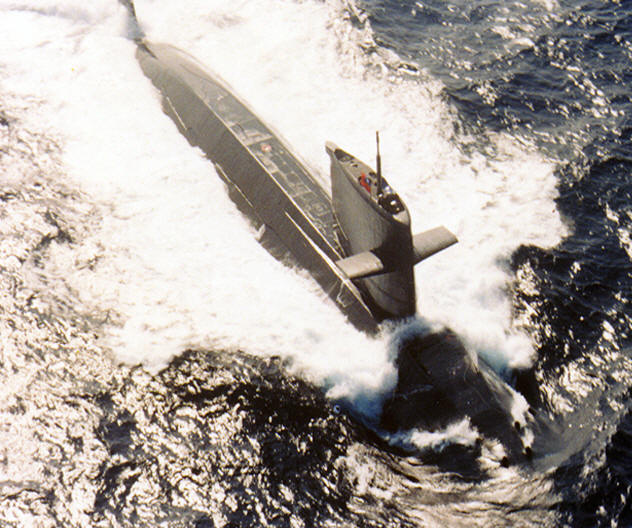
A modern submarine force to deter China’s ambitions to take over Taiwan tops the island’s unmet defense needs, its first civilian defense minister told a Washington, D.C., audience on Wednesday.
“We are far behind” in that arena, said Michael Tsai during an appearance at the Hudson Institute. After a proposed deal negotiated under President George W. Bush to have Taiwan buy diesel-powered subs fell apart, he said Taipai’s only recourse is to build submarines domestically. But “we need technical support from the United States, Japan and other countries” to do that.
The technical support includes torpedo systems and combat integration, said Seth Cropsey, a naval affairs analyst at Hudson.
Even with technical support and Taiwan’s strong financial underpinning, Tsai estimates it would take five to seven years to deliver that first submarine.
“We are still seeing if we can purchase used submarines for Taiwan” to meet the defense requirement immediately, Tsai said.
Taiwan has a lot of work to do to bring a submarine force up to standards to meet the challenges posed by China and its threats to use force, Cropsey said. The challenges include China’s practice of sending combat aircraft to circle Taiwan in dramatic shows of military force; China’s encouragement of divisions among Taiwan’s citizens over reunification, China’s use of economic, political and social pressure to isolate the island from other nations, and China’s blocking the Taiwanese government from joining international organizations.
“China and its military know the value of the first island chain” in its ability to project power into the Pacific, Cropsey said. “Taiwan serves as the anchor” in that chain that “is vital to the United States’ presence in the region.”
Tsai, an advocate of Taiwanese independence, said during the last two years, China has been “very, very aggressive. PLA [People’s Liberation Army] jet fighters cross over the middle line of the straits.” also, “frigates, destroyers cruise into our backyard — the Pacific Ocean. We don’t like it.”
As a result of Beijing’s actions, the United States stepped up its transits of the Taiwan Strait to demonstrate its commitment to the Taiwan Relations Act and continued presence in the first island chain off China’s coast.
The American sale of 66 F-16 fighters, M1A2 tanks, Stinger surface-to-air missiles and other modern equipment and parts to Taipei was called a deterrent to China’s ambitions in the Indo-Pacific by Tsai and Cropsey.
American support of Taiwan’s defenses since the adoption of the One-China policy late in the administration of President Jimmy Carter as being “inconsistent and sporadic,” Cropsey said.
Tsai noted that 80 percent of Taiwan’s foreign defense spending goes to the United States and France. “We should be working together” in developing advanced technologies. Taiwan is a recognized leader in electronics and chip technologies.
“We also need U.S. support morally and Japan’s, [all] good-minded democracies,” such as Taiwan, can be examples to other nations, particularly in Southeast Asia, like Vietnam, Singapore and the Philippines, Tsai said. Beijing is pressuring Southeast Asian countries and Australia, with territorial and political and economic threats, he said.
That pressure includes eliminating Taiwan’s diplomatic presence in Asian nations and leaning heavily on Taiwan’s neighbors to scale-back to scale-down their trade arrangements with Taiwan in favor of trade with the mainland. China is also exerting similar pressure on the Pacific island nations, in Africa and Latin America, Tsai said.
By showing a united front from Taipei to Tokyo to Washington, “China will understand we are working together” in areas broader than mutual security, Tsai said.
Among the concrete military steps that can improve relations, Tsai said, “We’d like to join multilateral, bilateral military exercises.”
Doing so signals to China of unity among the democracies and also enhance interoperability in response to a crisis, including humanitarian relief missions, he said.
“China was invited to RIMPAC four years ago,” but was disinvited to the most recent RIMPAC because of its aggressive behavior in the South China Sea. Instead, Tsai implied Taiwan should be invited to the next RIMPAC.
Tsai also called for American vessels to increase the number of port visits to Taiwan and for the U.S. Air Force to increase stop-overs to build military-to-military relationships. Other opportunities for joint activities include scheduling more joint counterterrorism and antipiracy operations, providing medical assistance, as Taiwan did in Afghanistan, and discussions to settle burden-sharing costs for these kinds of missions.
At a higher level, Tsai recommended “two plus two” regular meetings, possibly annually, between Taiwan’s defense minister and foreign affairs minister and their counterparts in the Pentagon and Foggy Bottom. The idea is to get them “talking about the military situation, the political situation” and possibly at some point expand those meetings to include Japan.
Tsai called for the end to the restriction barring those ministers and the president of Taiwan from coming to Washington for meetings with their Washington counterparts.
“China is against Taiwan becoming partners with the United States and Japan” over such a broad range of interests, he said.





